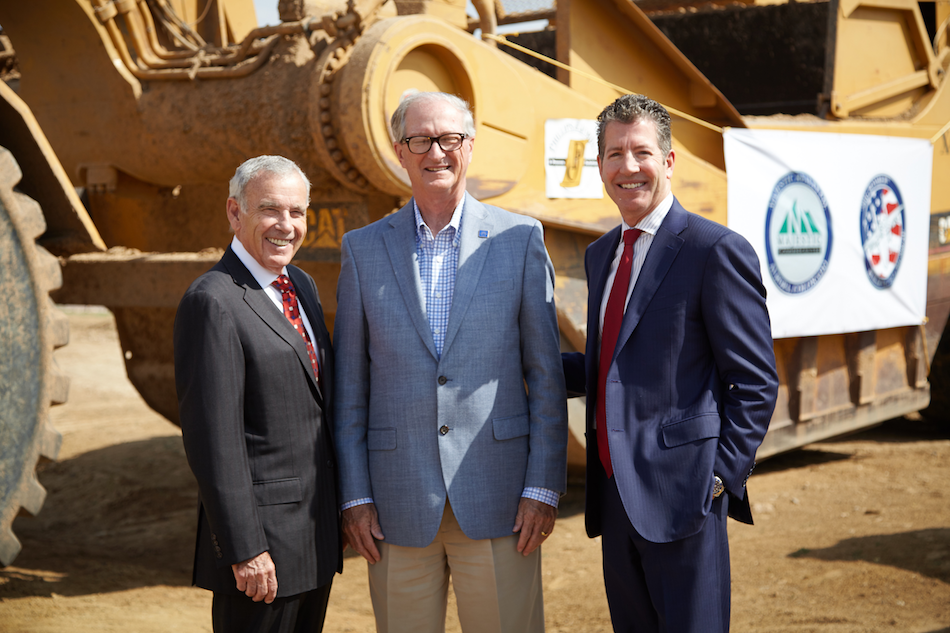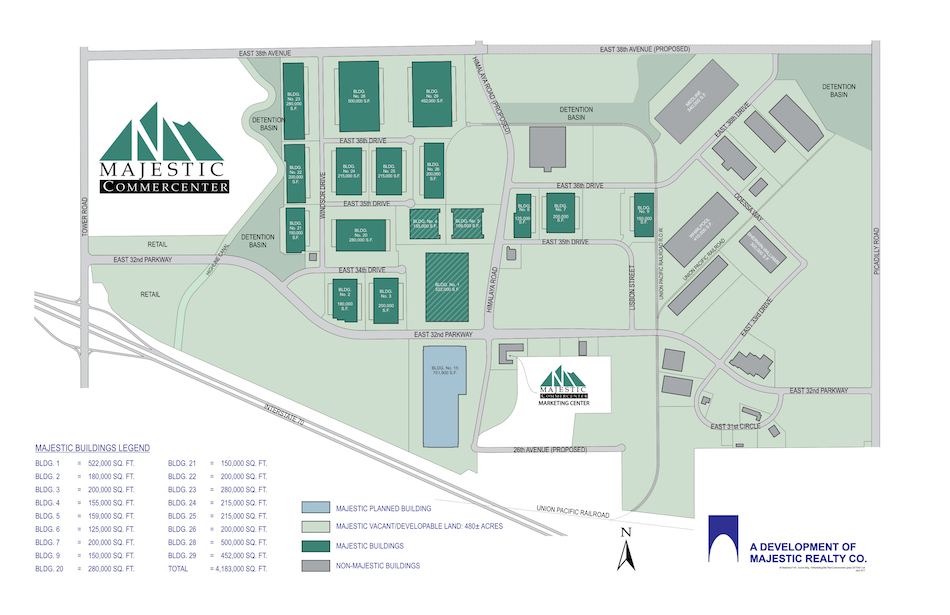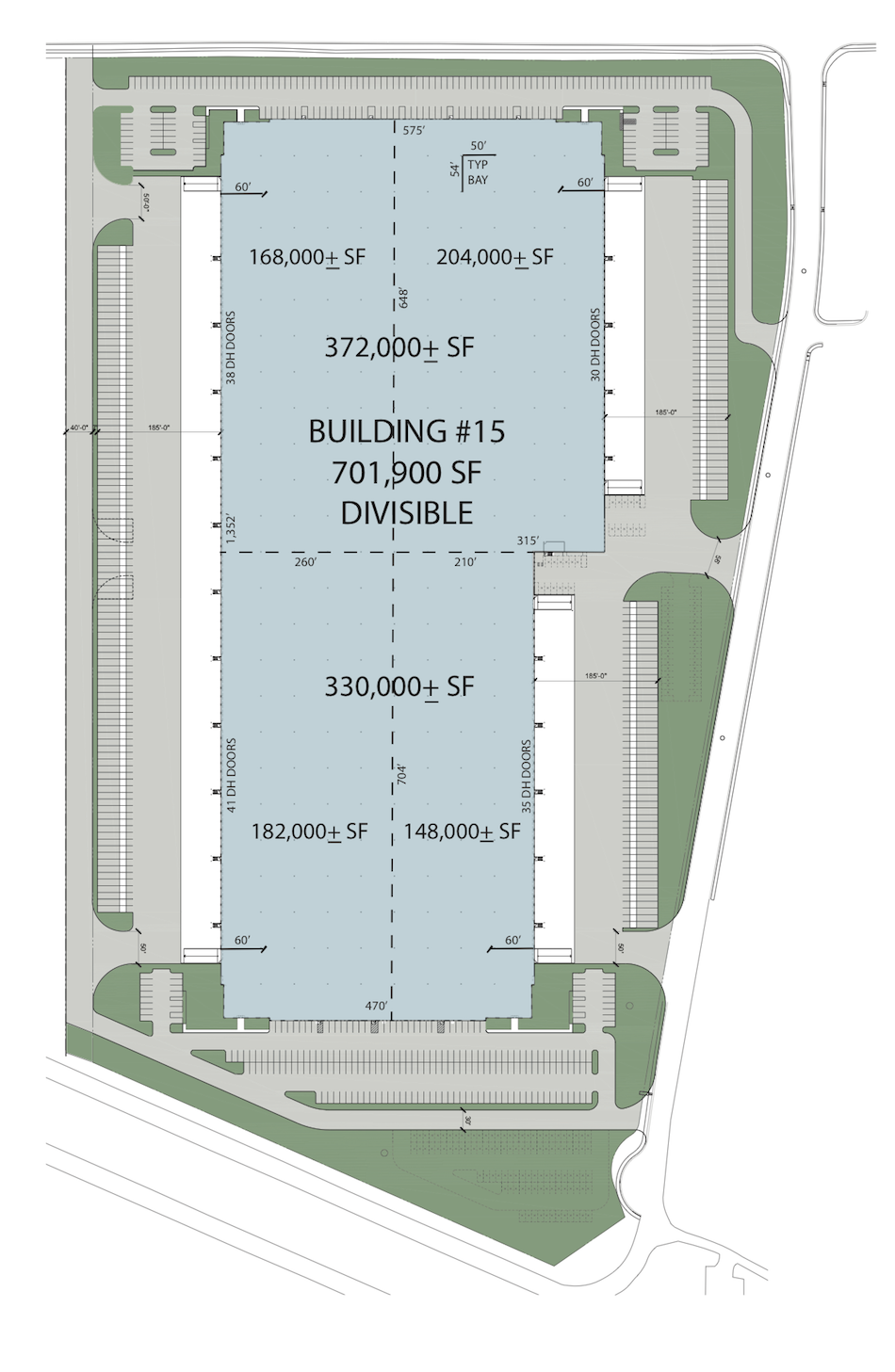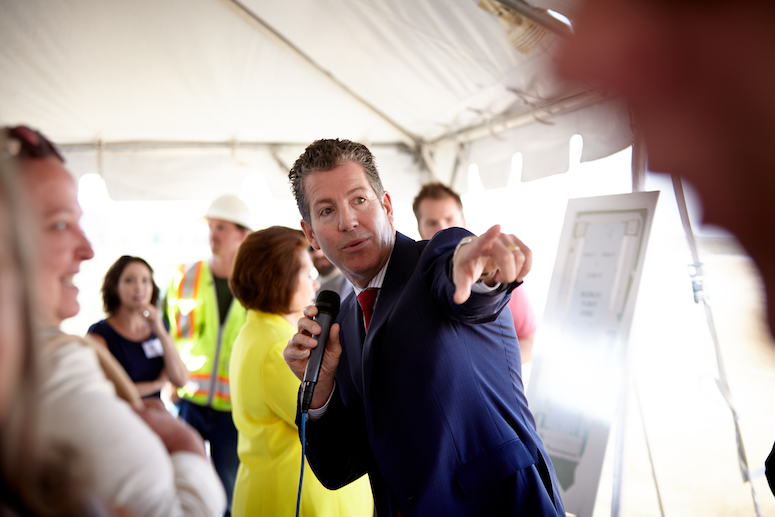It’s a lot to live up to if you named your real estate company Majestic.
“I didn’t name it that. My dad did,” Ed Roski Jr., owner of Southern California-based Majestic Realty Co., told me last week in an exclusive interview.
I wasn’t surprised that Roski didn’t choose the name of the company, the largest privately held industrial development company in the U.S.
Although he is worth $5.3 billion, according to Forbes magazine, and is a part-owner of the Los Angeles Lakers basketball and Los Angeles Kings hockey teams, and the Staples Center in downtown LA, with Colorado’s own Phil Anschutz, Roski is a down-to-earth guy.
He was in Denver or, more precisely, Aurora for the official groundbreaking of the 701,900-square-foot Building No. 15 in his company’s 1,500-acre Majestic Commercenter at Interstate 70 and Tower Road.
The building, under construction on a 36-acre site, has been affectionately dubbed the “Big Bomber” by the construction crews building it.

From left, Ed Roski stands next to Aurora Mayor Steve Hogan and Randy Hertel, executive vice president of Majestic Commercenter, at the groundbreaking of the “Big Bomber,” the largest spec industrial building in Colorado. Photo by David Gaston, Gaston Photography
The biggest spec warehouse building ever built in Colorado, an estimated 500 people will have worked on it before it opens early next year.
Today, Majestic Realty Co. owns a nationwide portfolio of about 80 million sf. To put that into perspective, 80 million sf is about 35 percent of the total industrial market in the Denver area.
Majestic Realty is a family business.
“What happened is my dad (Ed Sr.) was in the Navy in World War II and when he came back he was stationed in Southern California,” the 78-year-old Roski told me.
His father called his mother and told her he thought they should move to Los Angeles from Oklahoma City, where Roski was born.
“I must have been 6 when we got on the train and took it to Southern California,” he recalled.
His father founded Majestic Realty in 1948 as a real estate brokerage firm that sold warehouses.

The master plan map of the Majestic Commercenter. Ed Roski was there to celebrate the groundbreaking of the Big Bomber 22 years after the industrial park opened in Aurora.
“It was a good time to be in real estate,” Roski said. “Southern California was nothing but orange groves and things like walnut farms back then.”
As a boy, he remembers planting “For Sale” signs in front of warehouses that his father sold.
After college, Roski joined the Marines and served in Vietnam from 1962 to 1966. He clearly didn’t want to talk about it, but he received two Purple Hearts for his service. A decade ago, Roski and two military service colleagues founded the nonprofit Land of the Free Foundation to support programs that serve armed service colleagues and their families.

Ed Roski Jr. at the groundbreaking of Big Bomber in Roski’s Majestic Commercenter in Aurora. Photo by David Gaston, Gaston Photography
“I was a captain,” Roski said. “Joining the military was just something you did in that time.”
He came back to the U.S. and joined his father’s firm.
He doesn’t remember the first warehouse he developed.
“It was probably around 1971,” he said.
After that, he grew the company by responding to his customers’ wishes.
“We would build a warehouse for someone in LA and he might say, “I need a warehouse in Denver, or we need a warehouse in Atlanta, so we would go there.”
Denver’s industrial market is firing on all cylinders.
“Denver, right now, is about as active and healthy as any market in the country,” Roski said. “There is a lot of interest from companies for storage space with your low unemployment and strong economy.”
Nationwide, he said, Majestic is building bigger buildings than ever and not only in Colorado. Indeed, some of buidlings in other parts of the country dwarf the size of the Big Bomber.
“We’re building a 2.5 million-sf building for Wal-Mart in Florida,” Roski noted.

A site plan for the Big Bomber, the largest spec industrial building underway in the Denver area.
One of the biggest changes he has seen in the industry is the emergence of huge e-commerce centers.
“And it’s not just Amazon,” Roski said. “A lot of companies need these giant e-commerce centers.”
Some people might think that warehouses and distribution centers lack the cachet and sexiness of other commercial asset classes, such as offices. Not Roski.
“What I like about industrial buildings is that they supply the things every American needs, every day, for their lives,” he said. “We really help keep America functioning.”
That point has been hammered home by all of the flooding in Houston by Hurricane Harvey.

Randy Hertel points out a highlight of Big Bomber at the Majestic Commercenter. Photo by David Gaston, Gaston Photography
“We have a lot of buildings in Texas, including Houston,” Roski said. “Fortunately, our buildings in Houston were spared” by Harvey.
I asked Roski if he got a bigger thrill from developing industrial space or owning professional sport teams. I told him he shouldn’t hesitate in telling me what he really thinks.
“Honestly, I get a bigger thrill from this,” he said, waving to the west, where giant earth-moving machines were preparing the dirt for the Big Bomber.
“This is the business I’ve been in all my life. And, you know, Phil (Anschutz) and I don’t have anything to do with hiring the players.”












